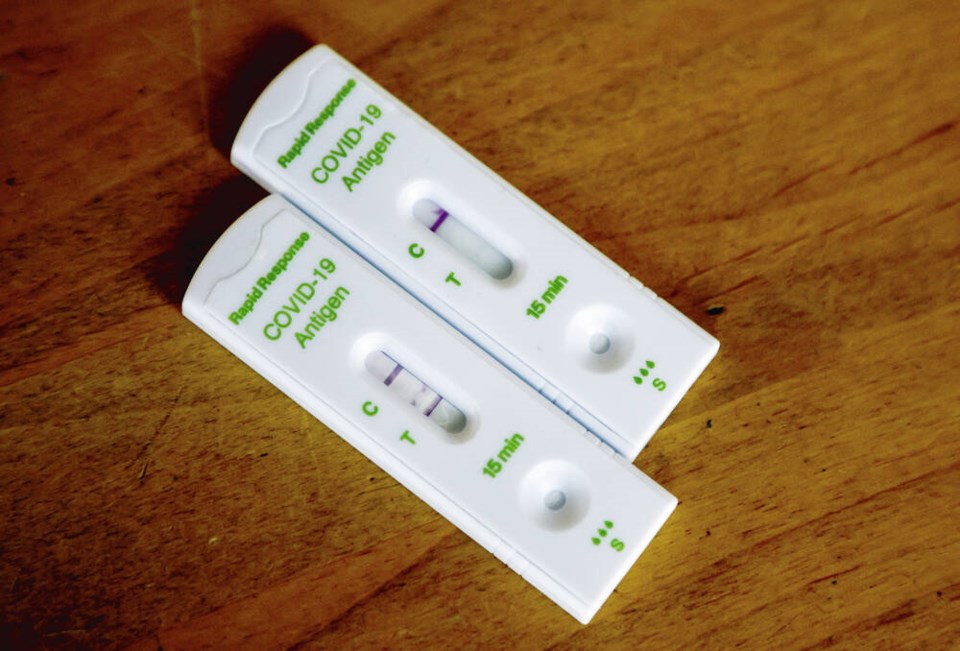COVID-19 cases should start to decline over the next month as the latest wave peaks, but the risk of infection is still high, says a COVID-19 disease modeller.
Data showing COVID-19 infections driven by the Omicron subvariant BA.5 have peaked is good news, said Sally Otto, an evolutionary biologist at the University of British Columbia.
“But it means we’re at the peak, the risks right now are really high — near an all-time-high infection risk for British Columbia at the moment — so we should be acting accordingly,” she said.
Otto is co-editor of the COVID-19 Modelling Group, which released its latest update last week. The B.C. Centre for Disease Control released new data Thursday that confirmed BA.5 infections have peaked and aren’t growing, but there are no strong signs of decline yet, Otto said.
Judging by the reduction in people masking in public indoor areas, some people believe the pandemic is over, but it’s definitely not, said Otto.
As of Thursday, there were 331 people in hospital with COVID-19, which is still a concerning number, although down from the all-time-high of 1,038 on Jan. 31, she said.
Otto said there’s an information gap when it comes to the number of COVID infections in the community, which the modelling group estimates are under-reported by “as much as 100 fold.”
There are few places to get tested for COVID and no requirement to report positive results from rapid tests.
The COVID-19 modelling group looks to the 70 and older age group for more reliable measurements, as that demographic is more likely to test, report and receive prescriptions for COVID.
Younger age groups have a higher exposure rate, but their reported numbers of infections are the same — another indication to modellers that COVID-19 infections over the summer have been “severely under-reported.”
“I think people would be masking more if they knew more about the current situation,” Otto said.”The good news is these infection risks should be declining over the next month, but right now they’re not low.”
COVID-19 deaths are also believed to be under-reported due to the way B.C. is collecting statistics, said Otto. As of April 2, the death of anyone within 30 days of a positive COVID lab PCR test is recorded as a COVID death.
As of Aug. 20, 4,097 COVID deaths had been reported in B.C. since the beginning of the pandemic.
The COVID-19 Modelling Group report says B.C. is likely “substantially” under-counting deaths due to COVID, which can raise the risk of stroke, heart attack and other diseases in the year after a COVID infection — far beyond 30 days.
Otto pointed to a study in Nature Medicine in the U.S. that showed a 55 per cent higher risk of major cardiovascular events like heart attacks and strokes in the year after a COVID infection.
Data showing cumulative excess mortality per 100,000 population since January 2020 show a large unaccounted for number of deaths, after drug-toxicity deaths, heat-related deaths and expected deaths are taken into account, Otto said.
Otto estimates COVID-19 deaths could be undercounted by a factor of two. “Many people don’t get that PCR test,” she said. “And so any deaths that did not get recently tested, even if they did have COVID and it was a contributing factor, they’re not included.”
Looking to the fall, the modelling group expressed optimism that B.C. residents have gained a high degree of immunity through a combination of COVID-19 vaccinations, boosters and infections.
Given that no other Omicron subvariant has “out-competed” BA. 5, Otto thinks we “have a bit of a reprieve, maybe a month or two” before another variant transmits better than Omicron in a highly immunized population.
Modellers are seeing evidence that people who have been vaccinated and infected, called hybrid immunity, are even better protected going into the fall.
COVID-19 has only explored its evolutionary possibilities for two years in humans, said Otto, so it’s still devising new tricks to get into different cells and avoid the ways that our bodies shut down viruses.
“So we don’t know what’s around the corner — all we can say is that there’s nothing right now that is causing us to be very concerned,” she said.
“If we’re lucky and this hybrid immunity is strong, we may not see the next wave until January or February. And if we boost them through vaccination, we can put that off even further.”
B.C. plans to roll out fourth COVID-19 boosters to those age 12 and older in the fall.
The province has so far made fourth doses available to people age 70 and older in long-term care and assisted living and in the community, Indigenous people age 55 and older, those who are clinically extremely vulnerable, and others deemed exceptions.



